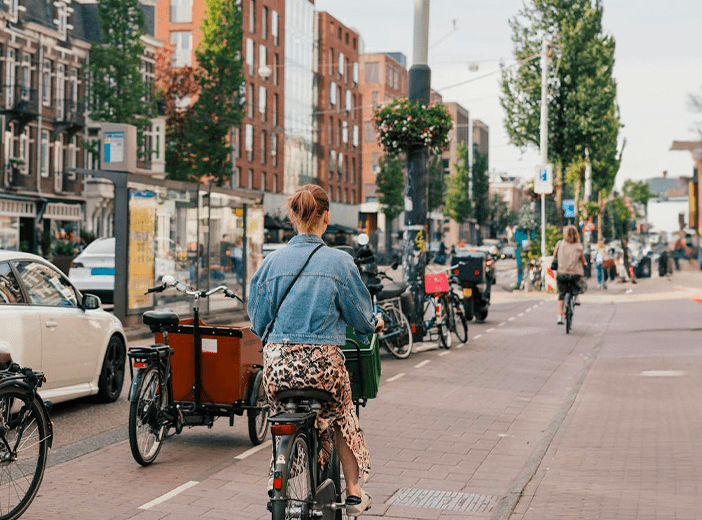How Bristol Uses Open Data to Improve Traffic and Air Quality
Smart city has become a buzzword this past decade, but how does it actually work? What tangible projects can smart cities empower, and what are the biggest challenges in the process? The city of Bristol has given us an answer.

Smart city has become a buzzword this past decade, but how does it actually work? What tangible projects can smart cities empower, and what are the biggest challenges in the process? The city of Bristol has given us an answer.
Ranked as UK’s top smart city just after London, Bristol has been a pioneer in sharing public data. We interviewed Bristol City Council’s Open Data Project Manager Marius Jennings and Programme Coordinator Steve Crawshaw to ask them these burning questions.
“A Smart City Has to be a Connected City”
Marius is the Open Data Project Manager at the Bristol City Council. He also works closely with the City Innovation Team, who helps deliver Bristol’s Smart City Strategy and aims to work with organizations and citizens to support innovations that respond to the challenges the city faces. On the daily, Marius has to think about ways to share and use open data, both internally with colleagues across departments and externally with a wide range of city stakeholders. “Our approach is really raising awareness of data, telling people what is open data, and then showing them the benefits. It’s a way of providing information that we, as a council, are obliged to provide through Freedom of Information,” said Marius when explaining his day-to-day tasks.
For Marius, open data is key to improve connectivity between the government, city stakeholders, and the citizens, and this connectivity is what defines a “smart city.” Having open data means unleashing endless possibilities to what can be done with the data. Rather than limiting the city’s collaborators to traditional city servicers like utility providers or transportation sectors, Bristol makes it clear that data should be made available for everyone who might have an interest. “This is a far more efficient way to be able to provide information to whoever is interested by giving them a one-stop shop to go and find what they need,” added Marius.
Whether it is university students, researchers, private sectors and small businesses, a smart city has to be a collaborative city. Bristol aims to use open data to connect different players together so that they are “able to do things in a better way than they were able to do in the past.” Marius mentioned the current challenges that Bristol face, “we are like the tale of two cities. On one side it is very affluent, successful, but on the other side around 10% of citizens live in some of the most deprived areas in the UK.” The challenge for Bristol is to empower projects that can support both sides of the city. “It needs to be lifting everybody up to move forward,” added Marius.
Bristol’s Case on Traffic Data: It Doesn’t Necessarily Have to be High Tech.
The core of a smart city is not advanced technology, but its people. “It doesn’t have to be high tech. It can be low tech, but is it actually doing things that is helping improve people’s lives? Is it looking at the challenges we face and finding innovative ways to overcome them?” Marius used several qualifying questions to define what truly is a smart city for him. Bristol has shown two excellent examples when it comes to using user-friendly technology to unleash the potential of a city within its community.
The first example is Bristol’s use of traffic data. Bristol City Council produces thousands of records daily, but the data was not utilized outside the council. “It is just literally sitting there,” Marius emphasized. Having a huge amount of data but no platform to allow sharing or reusing is often the dilemma facing other city governments. Marius explained the motivation for Bristol to dig into innovative ways to use the traffic data. He said, “we have been looking at different ways to provide this data to whoever is interested in it in a cost-effective manner, because we see the value of it… but we just didn’t have a mechanism to do it.”
Eventually, Bristol has decided to use an innovative piece of software called FME, in combination with its Opendatasoft portal. Program Coordinator Steve explained in detail: “What’s great is that this server is able to access data from the different servers that we have in the council as well as external data feeds, then extract that information in real time, and push it into the open data portal we have with Opendatasoft. And that’s really, really innovative for us because otherwise, the only way to update that information was for somebody to go and download for a period of time. And then I would go and start pushing it through manually.” The use of FME in combination with the Opendatasoft portal has enabled Bristol to collect various types of data including vehicle flow rate, vehicle speed, average journey time between two points, etc. and updating them daily. “We have 6 million records at the moment; and it grows daily by thousands,” Steve added.
Air Quality: From a City Initiative to a Citizen Initiative
A simple open data platform can empower a variety of projects through user-friendly manipulations. The second example is Bristol’s use of the open data portal on improving air quality. The UK’s emission level was not meeting EU directives around air quality, especially NO2 (Nitrogen Dioxide) mainly coming from diesel. For Bristol, the first step to improve air quality is to make the data and information available for citizens and various stakeholders. Marius emphasized that “it is about making everything as transparent as possible and showing citizens that this is the data, and this is how we process it.”
“We have around 110 air quality monitoring sites around the city, which monitors and produces data on pollution and different types of emissions,” Steve, the mastermind behind Bristol’s air quality dashboard, explained. On the portal, one can easily see various air quality indicators updated by the hour, and this is all done by using a standardized open data portal. With the historic records going back more than twenty years, Bristol’s portal gives citizens a good understanding of the impact and evolution of air quality, as well as a possibility to compare and observe the differences across neighborhoods to see where is the work needed the most.
What was a city’s initiative has become a citizen’s initiative. Individuals in the community have become interested in participating and providing air quality data from their own backyards. The Luftdaten Air Quality data is a dataset generated by individuals, who operate a low cost sensor at their homes and gardens that monitors and transmits air quality data every hour. Again, the real-time data from Luftdaten sensors in Bristol is published on the open data portal. This goes to show that community building and citizen engagement starts with the accessibility and transparency of data and information.
Air Quality Before V.S. During Covid-19 Lockdown
One might wonder about the air quality during the Covid-19 lockdown in comparison to normal levels. Trending photos of empty city streets and blue skies seem to show the drastic difference that a lockdown can make in terms of air quality. Steve was able to share a few insights: “Although we see many reports confirming that air quality has improved since the lockdown, the actual situation is more complex.” Indeed, the traffic lockdown has dramatically decreased the amount of emissions from cars, Bristol’s comprehensive collection of open data showed more nuances – certain pollutants have risen during the lockdown. More details on Bristol’s Covid-19 Lockdown Air Quality can be found on Steve’s report. The report directly accesses the air quality data on the portal using Opendatasoft’s API through an R Markdown document. The availability of millions of records and high quality visualizations on the portal will enable researchers to make more accurate and reliable recommendations regarding air quality.
Challenges for Bristol… and Other Aspiring Smart Cities
“The challenge is you need to have access to those with technical skills, and we are really, really fortunate to have Steve,” Marius highlighted the main challenge that any city will face in the digital evolution. The publication of data requires council officers that have technical knowledge to translate raw, collected data into something anyone can understand. The crucial role that technical professionals like Steve play is democratizing available data and removing the bottleneck for people to understand data. For other aspiring smart cities who are looking into becoming more connected and transparent, this is something to keep in mind.
“The long term goal for Open Data Bristol is to be a relevant resource for the city,” said Marius. This is especially true in 2020, as cities have to innovate and find new solutions to deal with crises that they have not dealt with historically. City as a data resource “enables people to do experimentation and helps us as a city to achieve our goals.” Finally, Marius highlighted with optimism, that “Bristol is a very good grassroots community, to make positive changes and to be innovative, and what we want to be is something that supports that community.”
If you are interested in reading some of the data reuse projects from the Bristol community, click here.
Thank you Marius and Steve for sharing the incredibly insightful knowledge on open data’s real-life use cases! Seeing Bristol’s example, we are excited to get to know other data visionaries around the world and how they leverage open data to improve their communities.




